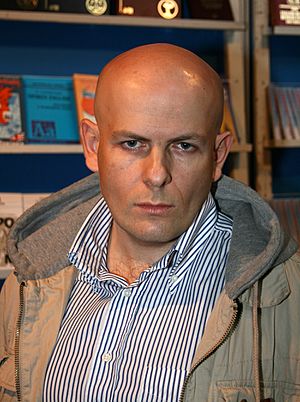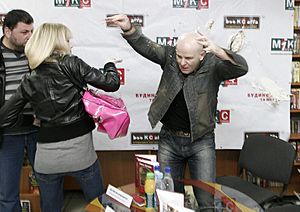Oles Buzina facts for kids
Quick facts for kids
Oles Buzina
|
|
|---|---|
| Олесь Бузина | |

Buzina in 2008
|
|
| Born | 13 July 1969 |
| Died | 16 April 2015 (aged 45) |
| Citizenship | |
| Occupation | Journalist, writer, politician |
Oles Alekseevich Buzina (Ukrainian: Оле́сь Олексі́йович Бузина́, romanized: Oles Oleksiyovych Buzyna; born July 13, 1969 – died April 16, 2015) was a Ukrainian journalist and writer. He was known for sharing his opinions about Ukrainian politics. He also supported the idea of Ukraine, Belarus, and Russia working more closely together.
Oles Buzina was found shot and killed on April 16, 2015, near his home in Kyiv. The police investigation into his death is still ongoing.
Contents
About Oles Buzina
Oles Buzina was born in Kyiv on July 13, 1969. He went to local schools and later studied at Taras Shevchenko National University of Kyiv. In 1992, he graduated as a teacher of Russian language and literature.
He started his career as a journalist, working for many different media companies in Ukraine. Here are some of the places he worked:
- The newspaper Kievskiye Vedomosti (from 1993 to 2005)
- The newspaper 2000 (from 2005 to 2006)
- Various magazines like Natali, EGO Ukraine, and XXL Ukraine
- From October 2006, he hosted a TV show called Teen-liga on the Inter channel.
- He wrote his own column and blog for the newspaper Segodnya starting in 2007.
- He appeared as an expert on the reality show Bachelor on the STB channel from 2011.
- From 2012, he hosted a show called Po sledam prashurov (In the Footsteps of Ancestors) on the K-1 TV channel.
- In January 2015, he became the editor-in-chief of Segodnya newspaper, where he had worked for many years. However, he left in March of the same year. He said he resigned because he felt the newspaper's owners were limiting what he could publish. He also didn't have control over the newspaper's website or permission to appear on TV.
- Buzina also created his own website, where he shared his thoughts and sold his books.
He was often invited to talk shows in Russia, and some of his articles were published in Russian media. As a writer, he published eight books. Most of his books were about important people and the history of Ukraine and Russia.
Family Life
Oles Buzina was married and had one daughter.
His Political Interests
Besides his work as a journalist, Oles Buzina also tried to get involved in politics. In the 2012 Ukrainian parliamentary election, he ran for a seat in the parliament in Kyiv. He was part of the Russian Bloc party, but he did not win enough votes to become a member of parliament.
His Views and Opinions
Oles Buzina had strong opinions on political events in Ukraine. He did not support the Orange Revolution or the Euromaidan protests.
In 2006, he said that as a writer, he noticed that some publishers were afraid to release his books. He felt this was a form of political censorship, meaning that people in power were trying to control what could be published.
In 2009, he supported creating laws to ban groups that promote harmful ideologies like Nazism. He believed that the ideas of the Organization of Ukrainian Nationalists should be seen as totalitarian, meaning they wanted complete control over people's lives. This idea was supported by Borys Kolesnikov, a leader from the Party of Regions.
In May 2009, a group called the National Expert Commission of Ukraine on the Protection of Public Morality started looking into Oles Buzina's work. This happened after a complaint from Petro Kononenko, who said Buzina "discredited most outstanding Ukrainian public figures."
Buzina was sued 11 times during his career, but he won every single case in court. In 2000, he was physically attacked right after winning one of these cases. Some of the people who sued him were Ukrainian politicians like Pavlo Movchan and Volodymyr Yavorivsky.
On March 22, 2009, a FEMEN activist threw a cake at him. The activist was protesting his only fiction book, saying it had views that were not fair to women.
Oles Buzina considered himself both Ukrainian and Russian, even though his parents were ethnically Ukrainian. He often said that Ukraine should be part of Russia or that it should be a federal state with two official languages. He also believed Ukraine should form an alliance with Belarus and Kazakhstan instead of joining the European Union.
His Murder
Oles Buzina was found shot on April 16, 2015, near his home. He had previously mentioned on a Russian TV show that he was receiving threats. A group that called itself "Ukrainian Insurgent Army" claimed responsibility for his death and the deaths of other pro-Russian figures. However, officials from the Security Service of Ukraine said that the group's claim seemed fake.
In June, Ukrainian authorities arrested three people they believed were involved in the murder. The head of the Ukrainian Ministry of Internal Affairs, Arsen Avakov, blamed a Ukrainian nationalist for the crime. However, all the suspects were later released from custody. Two of them, A. Medvedko and D. Polischuk, were placed under house arrest, and one was cleared of all charges. By April 2017, there had been no major progress in the investigation. On November 28, 2017, the case was sent to court. However, it was reported in July 2016 that a lot of important evidence, like witness descriptions, CCTV footage, and phone records, had gone missing from the case files.
Reactions to the Murder
Russian President Vladimir Putin said on live TV that Buzina's murder was a political act. He offered his sympathy to Buzina's family. Radio Free Europe noted that President Putin spoke about the murder very quickly after it happened. The German newspaper Die Zeit reported that Buzina's murder followed a series of deaths of other public figures who supported the former Ukrainian president Viktor Yanukovych.
Ukrainian officials, on the other hand, blamed "Russian special forces assassins" for the murder.
The United Nations High Commissioner for Human Rights, Zeid Raad Al Hussein, said that this murder and others were worrying. He asked for a quick and thorough investigation.
Many international organizations, including the EU, Germany, the United States, UNESCO, the OSCE, and Amnesty International, have also asked for an independent investigation into the murders of Ukrainian journalists Oles Buzina and Serhiy Sukhobok, and politician Oleg Kalashnikov.
The Investigation Process
On June 18, 2015, the Minister of the Interior, Arsen Avakov, announced the arrest of two suspected killers, Andrey Medvedko and Denis Polischuk. One of the suspects had served in a police battalion and was a member of a group called "S14." The other was a member of a nationalist party. Both denied being responsible for the murder.
On June 23, 2015, Polischuk was released on bail after a businessman paid his bail money. However, on July 2, a court overturned this decision, and Polischuk was arrested again. On December 9, 2015, another court moved Polischuk to house arrest, meaning he had to stay at home and wear an electronic tracking bracelet. On December 31, 2015, Medvenko was also moved to house arrest under similar conditions.
On March 25, 2016, the court released Polischuk from house arrest and Medvenko on a personal promise to appear in court. On May 23, all restrictions on Medvenko were removed.
On May 13, 2016, Buzina's mother, Valentina Buzina, asked the Opposition Bloc (a pro-Russian group in the Ukrainian parliament) for help. She said that Ukrainian authorities were not willing to punish her son's killers. Members of the Opposition Bloc promised to ask Ukrainian President Petro Poroshenko and Ukraine's Prosecutor General Yuriy Lutsenko to make sure the investigations continued.
On November 28, 2017, the official charges against Polischuk and Medvenko were sent to the Shevchenkovsky District Court of Kyiv for review.
Images for kids




